
In the language of business, there is a particular model called The Blake Mouton Grid that gives a clear view of the leadership quality which further reflects the outcome of an organization. This grid explains effectively the importance of emotional intelligence in leadership. Emotional intelligence is nothing but a sense inside a person's mind that helps him to understand the emotional condition of other people as well as himself.

Emotional intelligence is one of the most vital aspects of an organization. The postgraduate diploma in train the trainer with L&D gives valuable information on how to raise the level of such a sense. Emotionally intelligent leaders have been one of the successful ones due to their concern for the employees as well as performance outcome is always balanced.
Components of Emotional intelligence:
Every basic concept in this world is based on certain components. Each of those components has an equal contribution to let the concept function successfully. There are 5 basic pillars of emotional intelligence. They are:
Ability to self-motivate
It is extremely important to have a decent amount of emotional intelligence in people. Unless a person is emotionally active and does not know how to react to a certain scenario, it is difficult for that person to sustain in this world. Similarly, in the corporate world, emotional intelligence is being valued a lot.
Such leaders will contribute a lot to generate the expected outcome keeping in mind the skill sets and emotional needs of the employees. The training and development sessions will enhance the emotional intelligence level of the leaders via certain essential learning and development methodologies.
A leader who is not emotionally intelligent will always fail to understand the needs of the employees. As a result, there will be a huge communication gap and a particular project will never achieve the desired outcome. Also, if someone is not able to understand why a consistent performer is not being able to perform lately, then the result will be disastrous.
Neither the employee will be able to get the same level of enthusiasm nor the leader will find out the reason behind a sudden inconsistency. The situation will go totally beyond control and the assigned task will never reach the target point.
How do the components of emotional intelligence work?
It is not at all rocket science. The 5 basic parts work together and frame a sane emotional intelligence level.
Self-awareness: It is always important to know yourself. If you do not understand your emotions, capabilities potentials, etc., you shall never be able to complete a task. You must understand how your actions will affect the status of the organization. You, being a leader, should always figure out the best way to react as per a situation demands.
You must know your strengths and weakness. This will always help you measure your potential and will set a boundary beyond which you should think twice to cross. You can be a risk-taker but you must know if you can mitigate risk properly. Such self-evaluation will always lead you on the right track.
Self-management: It is all about self-control. Being an emotionally intelligent leader, you must always know how to control your emotions. Suppose, one of your employees is having a mental breakdown while he is responsible to submit a crucial portion of a project by a deadline. You can clearly understand that the employee is not in a state to perform the task while the urgency is pretty high.
In that case, you should not panic. Instead, you can ask the rest of your teammates to divide that particular task among themselves. It will take lesser time to finish. At the same time, feel free to talk to that particular employee who is not in a good shape. Try to figure out what is bothering him/her. Hence, a sense of closeness will develop where he/she might share the problem with you.
Empathy: Remember, unless and until you put yourself in someone else's shoe, you shall never be able to empathize with someone. Well, practically it is not always possible that you have to go through the same condition which your employee(s) is going through. Over here, you can take some time and try to put yourself in his/her place and think from that point of view.
Again, perspectives do matter and they're different from different angles but still, once you understand the intensity of the agony, you shall be able to make the right decision. Being an empath is a tough job because thinking from somebody's point of view is not our regular cup of tea.
Social skills: If you know how to communicate clearly with your employees, half the job is done here. There should be no cold and transparent wall between you and your employees. Your level of emotional intelligence will matter a lot when there is a both-way discussion.
Your employees must be aware of the expectations you're having from them. Always support the personal growth of your employees. If you find out that one of your teammates is trying to solve an issue using an innovative method, have patience and check out the pros and cons of that method.
If there is no red flag, encourage that employee to work on the new method. Everyone loves recognition and appreciation. Your employee will be loyal to you if he/she realizes that you have enough faith in his/her activities.
Ability to self-motivate: If you are an emotionally intelligent leader, you will always work hard on your personal growth. At some points, you might feel demotivated, anguished, and the stress level might go cross the bar. Such crucial times will tell if you can motivate yourself to dive back into the action or not.
Never forget how hard you have worked in the past to produce efficient outcomes for your organization and how ardently your employees are looking up to you. At moments when you will feel a lack of confidence, always remember that nobody could ever imagine that the pyramids could be built without any lever or pulley but the impeccable skills of human beings have done it.
Therefore, emotional intelligence is important in leadership as well as in every aspect of life. Online Specialised Train the Trainer Program for L&D Professionals will help! Having a sane and balanced level of emotional intelligence will always help you to chalk out strategies as per the situation's demand. You will always grow more, both personally and professionally if your level of emotional intelligence is high.
Written By : Victoria Lewis
Centre For Training & Professional Development (CTPD) - The Trading brand of TTA Training Private Limited, India is a ISO 9001:2015 Company




© 2021 - Centre For Training & Professional Development (CTPD). All Rights Reserved. Centre For Training & Professional Development (CTPD) trading brand of TTA Training Pvt. Ltd (India) - CIN U80902WB2016PTC215839, Asia Teachers Training Co., Ltd (Thailand) - Registration No. 0105558193360 & Asian College Of Teachers Ltd (UK) - Company Number 9939942 & Asian College Of Teachers LLC, (USA) - Federal Tax Identification Number 30-1261596
Designed by kreativewebtech